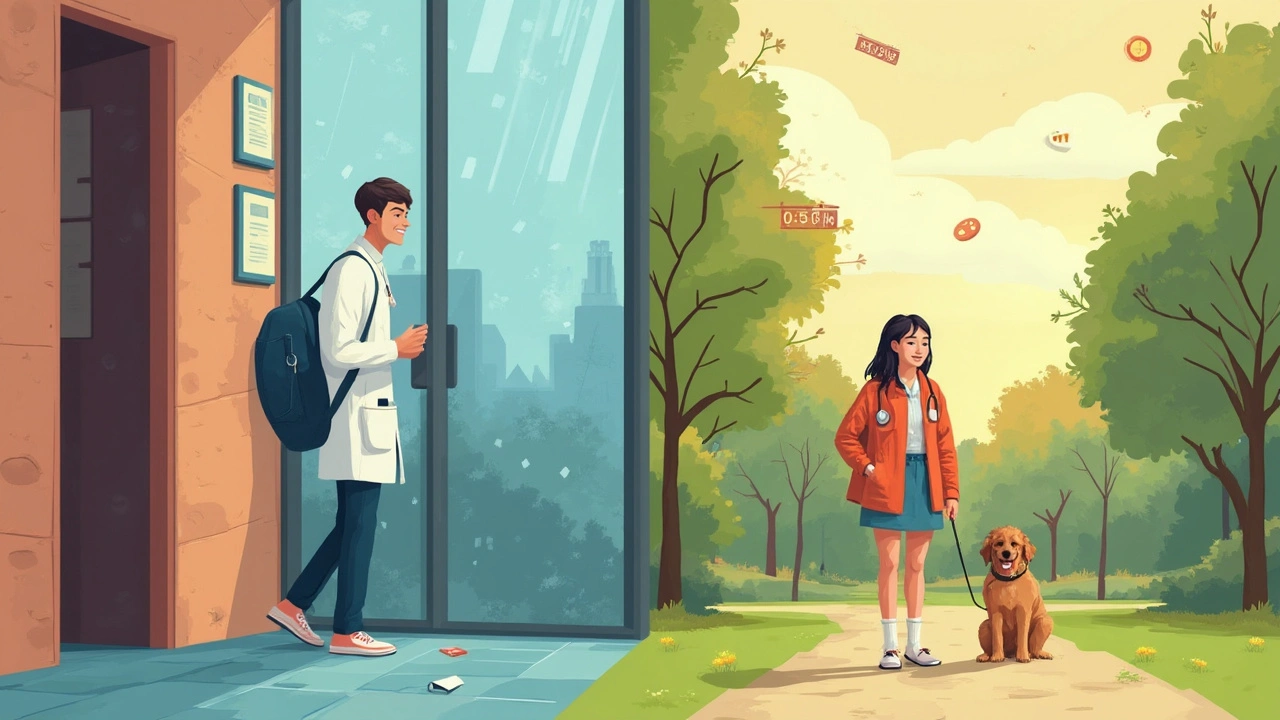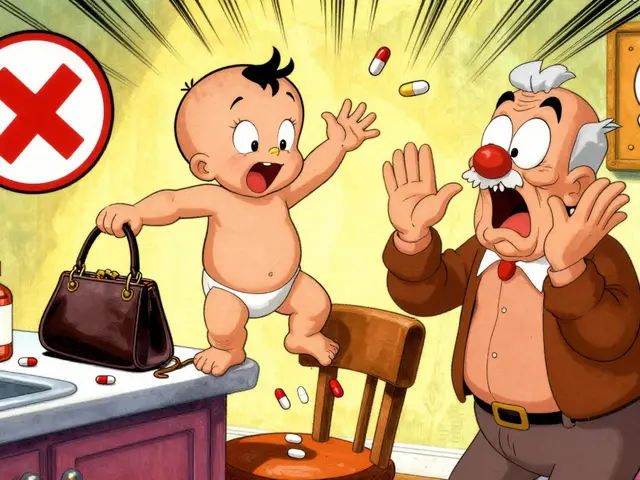The chat around antidepressants is usually loaded with opinions, warnings, and more than a few horror stories. When it comes to Effexor (also known as venlafaxine), it can feel like you’re sifting through a minefield of information, some accurate and some not so much. Here’s the thing: nobody talks about Effexor unless they’re thinking of starting it, already on it, or trying to escape what they call ‘the Effexor ride.’ But with tens of millions of prescriptions handed out since it hit U.S. pharmacies in 1993, it’s clear a lot of people are on this train—so let’s get honest about what that’s really like.
What Exactly is Effexor and How Does It Work?
Effexor stands out because it’s one of the original “dual-action” antidepressants, messing with not just one, but two major neurotransmitters in your brain: serotonin and norepinephrine. Most older meds, like Prozac or Zoloft, only mess with serotonin and are called SSRIs. Effexor is technically an SNRI—serotonin-norepinephrine reuptake inhibitor. The way this works is, Effexor stops certain brain cells from sucking up serotonin and norepinephrine after you use them, so you’ve always got a little more floating around, which is supposed to keep your mood a notch higher and cut down on anxiety.
The most common reasons people are prescribed Effexor are major depressive disorder, generalized anxiety disorder, panic disorder, and social anxiety disorder. Pretty wild fact: A 2023 report from the CDC put venlafaxine among the top 10 most prescribed antidepressants in the U.S., with nearly 20 million prescriptions filled that year. While there’s always debate over just how or why these meds help, solid research from the American Journal of Psychiatry has found that about 60-70% of people with major depression see noticeable benefits from drugs like Effexor after a few weeks.
There are two main forms: the regular one (just called venlafaxine) and the XR version (extended release), usually taken once a day. Extended release usually means fewer side effects because the drug enters your system slower. The standard starting dose is 37.5 mg per day, but people can end up anywhere from 75 mg to 225 mg, or even up to 375 mg for very severe cases. Don’t mess with your dose without talking to a doc—snapping tablets in half may seem “DIY,” but it leads to uneven levels and some uncomfortable surprises.
The full effect can take anywhere from 2 to 6 weeks. That might sound like forever if you’re struggling, but it’s not unusual with antidepressants. Some people claim to feel better within days, but that’s more likely a placebo effect or just the experience of doing something to address their situation. It’s good to set expectations so you don’t bail if you’re not magically cured after three days.
| Fact | Detail |
|---|---|
| Generic Name | Venlafaxine |
| FDA Approval | 1993 |
| Prescriptions (US, 2023) | 19.5 million |
| Average Starting Dose | 37.5 mg/day |
| Maximum Dose | 375 mg/day (severe cases) |
| Time to Notice Effect | 2-6 weeks |
| Primary Uses | Depression, GAD, Panic, Social Anxiety |
Side Effects: The Good, The Bad, and The Straight-Up Weird
Side effects are where Effexor gets its rep—for better and worse. The most common one is nausea, which about one in three people run into. Most doctors warn you this goes away within a week or two (and, for most, it does). Here’s what’s more common, based on FDA data and actual user reports from places like Drugs.com and Reddit’s r/antidepressants group:
- Mild nausea and upset stomach (reduces over time)
- Dry mouth
- Sweating—sometimes profusely and at random times of day
- Sleepiness OR insomnia (the direction is unpredictable)
- Increased blood pressure (so your doc will want to check this regularly)
- Sexual side effects: trouble climaxing, decreased libido—occurs in at least 30% of users
- Appetite changes, usually less hunger, but sometimes more
- Headaches
- "Brain zaps"—a weird, electric shock sensation in the head, usually tied to missed doses or withdrawal (much more rare, but notorious)
Fun fact—one thing nobody tells you: If you switch from taking it in the morning to night (or vice versa), your side effects can totally flip. Also, going on the extended-release form instead of standard can smooth things out. For a lot of people, taking Effexor with a meal helps dodge the nausea completely. And coffee? If you can, ease up on it; combining caffeine with Effexor on an empty stomach is asking for jitters.
One of the big draws for Effexor for some folks is that, unlike other antidepressants, it can actually help with certain types of chronic pain and even hot flashes in menopause. Doctors sometimes prescribe it for those off-label reasons.
Let’s not sugarcoat withdrawal. Missing even a single dose can result in you feeling dizzy, like you’ve got the flu, or snapping at the smallest thing. The reason? Effexor has a pretty short half-life—your body processes it fast, so levels drop off a cliff quickly. That’s why doctors urge slow tapers when coming off, often over months, not weeks. If you go cold turkey, expect the infamous “brain zaps” and a mood roller coaster. One 2021 study found that withdrawal was “mild” for only about 30% of users, and “moderate to severe” for the rest, proving this isn’t just hypochondria.

What Is It Really Like to Live on Effexor?
This is where clinical studies start to blend with real-life stories. Most people start to see either their mood, anxiety, or both get a little more manageable after a couple weeks, which is nothing to sneeze at. A lot of users say they feel "less edge"—not numb, just less rattled by stuff that used to spiral them. However, about a quarter of people will feel flat or lose some emotional highs and lows; your mileage may vary.
Mornings often get easier for folks with anxiety after a few weeks on the drug. People with depression report finding motivation to shower, go out, or even return texts—tiny things, but huge if you’ve been stuck. Data from a Harvard summary in 2023 notes that nearly two out of three patients on Effexor stayed on the drug for at least six months, a better rate of sticking to treatment than some older antidepressants.
The sexual side effects are a dealbreaker for some. If it happens to you, ask your doctor about ‘drug holidays’ (skipping on days you don’t need the effect—controversial, but common) or adding medications that can counteract the sexual side effects (like bupropion, also known as Wellbutrin). Some folks have luck with over-the-counter stuff like maca root or zinc supplements, but double check those with a doc, especially for weird interactions.
Ever feel like you’re sweating for no reason? That’s a big topic on forums. Keeping hydrated, wearing breathable fabrics, and even switching to clinical-strength antiperspirant can make a big difference. For wild dreams or night sweats—super common—some users find that moving the dose to the morning fixes both.
If you’re sensitive to caffeine or alcohol, Effexor will make you more so. People who drink while on it sometimes notice they get tipsier quicker and bounce back slower. Not a reason to never have a beer, but you’ll want to see how your body responds before throwing back shots with friends.
Long-Term Use: What to Know Before You Commit
Staying on Effexor long-term (as in, more than a year) isn’t uncommon. Recent insurance data shows almost 40% of people prescribed Effexor remain on it for at least two years, especially if it’s helping with both mood and anxiety. Unlike old-school antidepressants, Effexor doesn’t typically mess with your weight too much—on average, people gain less than a few pounds after several years, according to a meta-analysis in JAMA Psychiatry. If you find yourself gaining a lot, look at other factors, like sleep, diet, stress eating, and thyroid function, which Effexor can rarely mess with.
Your doctor will likely want to check your blood pressure regularly after you’ve been on it for a while. About 10% of people on higher doses see a jump in numbers, and it’s usually dose-dependent. Don’t skip these checks, because untreated hypertension can cause more issues than depression.
Withdrawal symptoms remain a reality—even after months or years. The longer you’ve been on, the slower you’ll want to taper. Long-term users have created DIY tapering strips (tiny, decreasing doses) or work with compounding pharmacies to get this right. There are entire online communities, like Facebook groups and private forums, just to support people on or coming off Effexor, which says a lot about just how passionate people get about this drug.
Success rates with Effexor seem to be especially strong in people with both depression and anxiety—dual-action sometimes covers both bases better than plain SSRIs. But if it isn’t working for you, don’t be afraid to ask about switching up. Finding the right antidepressant is often more art than science, and what works for your sister or cousin won’t always work for you.
One more thing—and this is rare, but worth knowing: at extremely high doses, especially over 300 mg per day, there have been reports of cardiac issues and severe blood pressure spikes. That’s why max doses have slowly been trimmed down (most docs don’t go past 225 mg now). Always tell your doctor about any chest pain, irregular heartbeat, or unusual headaches.

Effexor Tips, Tricks, and Real-Life Lifehacks
Nobody wants side effects or drama with their meds, so here’s the real-world hacks crowd-sourced from actual users and nurses who deal with this stuff every day:
- If you’re just starting: Eat with your dose, not before. Food helps with digestion and tamps down the nausea many feel for the first week or two.
- Set alarms for your dose. Effexor’s short half-life means you need consistency. Missing even a few hours can make you feel crummy—set up a recurring alarm on your phone or watch.
- If you’re going up or down in dose: Try to move up in small increments (doctors can prescribe 25 mg, 37.5 mg, or 50 mg steps) over weeks, not days.
- Hydrate like a camel if sweating is bad. Electrolyte drinks or adding a pinch of salt to your water can keep you from feeling run down.
- Don’t taper off without a plan. Cold turkey is miserable. Use a pill cutter or, for the XR, open capsules and count beads if your doctor gives the green light. Many use the ‘bead counting’ method: reduce by only 5-10% per week.
- Keep a symptom diary. Track when you take the drug, side effects, and how you’re feeling. Bring this to every check-up; it makes for way quicker tweaks.
- If you have to skip a dose, take it as soon as possible—but don’t double up if you’re within a few hours of your next dose. Call your doc if you feel seriously off.
- Watch caffeine and alcohol. Some people get a racing heart with coffee, or feel extra hungover with alcohol. Adjust as needed.
- For sexual side effects, talk to your partner. Sometimes communication or simple scheduling helps, and there are workarounds.
You’re always more than your medication. But having the lowdown on Effexor means the drug won’t end up running your life—you will. If you need extra help, there are a ton of peer support groups online and mental health advocates sharing their firsthand stories on YouTube and social channels. Mental health is personal, and so is the way Effexor plays out. Don’t let anyone else’s horror or success story be the only thing you listen to. Your journey with Effexor is yours to steer.





Darin Borisov
July 18, 2025 AT 14:23In an era dominated by burgeoning polypharmaceutical regimens, Effexor, or venlafaxine, emerges as a paradigmatic case study in psychopharmacology's labyrinthine complexity. This article endeavors to dismantle the persistent obfuscations surrounding Effexor's pharmacodynamics and side effect profile that the lay populous often grapples with.
Notably, the emphasis on empirical data interwoven with anecdotal cautionary tales provides a dual-layered narrative that transcends simplistic exposition. However, it is imperative that clinicians and patients alike remain vigilant in parsing through such discourse, given the heterogeneous response spectra and the potential for iatrogenic complications.
One must also consider the socio-cultural determinants that influence patient adherence and perception of efficacy. The elucidation of long-term sequelae in this piece is particularly germane, as it confronts the often-neglected domain of neuroadaptive processes and their clinical ramifications.
In sum, this comprehensive treatise serves as a critical intellectual resource, fostering informed decision-making and nuanced understanding within psychiatric therapeutics.
Nathan Squire
July 19, 2025 AT 03:53Ah, venlafaxine. Quite the double-edged sword, isn't it? On one hand, it disrupts the neurochemical chaos that plagues folks with depression and anxiety; on the other, it gifts us a panoply of side effects that can feel like punishment for seeking help.
The article sounds quite promising, especially with its promise of real-world numbers and actionable tips. Practical advice to mitigate side effects is paramount because many patients are left to fend for themselves, relying on draconian trial and error.
But here's a philosophical question: do we ever truly understand the full extent of the neurochemical symphony altered by antidepressants, or are we forever just shaking in the dark?
Perhaps the answers lie, not purely in pharmacology, but in embracing holistic understanding — incorporating mental health with empathetic care.
satish kumar
July 19, 2025 AT 18:20Honestly, I find this whole fuss about Effexor a tad overblown. It's just another drug, right? Are we to believe that all those side effect stories should deter us from considering what could actually help?
Sure, this article might offer numbers and tips, but let's not kid ourselves about real efficacy. Sometimes long-term use of any antidepressant feels like jumping from one frying pan into another fire. And those 'real-world' experiences? Anecdotes are hardly empirical evidence.
Also, do we really need another guide when the drug companies have their own versions?
Sean Kemmis
July 20, 2025 AT 10:26Interesting post. I think the article cuts through some of the noise surrounding Effexor and highlights important factors worth considering. Without excessive hype.
That said, I find many users don't get a full understanding of potential trade-offs — they want results without risk. It's pretty naive to think all side effects are minimal or easy to manage.
Also, I wonder about the long-term psychological impact of relying on these medications versus implementing other therapeutic measures. Is the medication masking symptoms rather than helping people grow?
Food for thought.
John Moore
July 21, 2025 AT 01:43Thanks for sharing this. As someone who's advised friends and family about antidepressants, I appreciate articles that focus on practical, real-world advice. Side effects are a huge roadblock for many.
I'm curious if this guide touches on the tapering process and how to successfully withdraw without severe rebound symptoms, which is often overlooked. Also, does it discuss medication interaction warnings? That's a missing piece in many resources.
Ultimately, mental health support should involve a multi-pronged approach, and medication should complement therapy, not replace it.
Would love to hear others' experiences.
Kimberly Dierkhising
July 21, 2025 AT 16:26This guide seems to be a great addition to the growing body of resources that prioritize transparency and actionable insights for antidepressant users.
One thing I always emphasize when mentoring new patients on medication journeys is the importance of patient agency — knowing what's going on, asking informed questions, and collaborating with healthcare providers.
Effexor, with its complex pharmacological profile, requires users to be well-informed. So any article that demystifies it and cuts through jargon is a win. I hope it also addresses the social stigma sometimes associated with antidepressant use.
Education and community support often go hand in hand for successful outcomes.
Matthew Marshall
July 22, 2025 AT 18:00Not to throw shade, but reading this made me think how many people get sucked into the antidepressant trap — thinking Effexor is some miracle fix. The drama of side effects, withdrawal, and feeling numb is real.
People need to be ready for the rollercoaster and should never underestimate how life-altering these meds can be. The article probably helps, but honestly, watching your mental state fluctuate like that could make anyone a drama king.
Still, if it helps folks get some relief without total wreckage, it's something. Would love more discussion on personal stories here.
Rich Martin
July 25, 2025 AT 15:26Look, antidepressants like Effexor are fascinating from a neuroscientific perspective. They alter neurotransmitter systems that underpin our mood and cognition; yet, the mechanisms remain imperfectly understood, which fuels controversy and misunderstanding.
I think the article's promise of clear, accessible info is crucial, especially since many patients feel lost in clinical jargon or contradictory advice.
Of course, we must acknowledge that drugs are not panaceas — they're tools within a larger framework of mental health care. Hopefully, this guide helps ground expectations realistically.
And honestly, more conversations about this topic can only help destigmatize mental illness and treatment.
Buddy Sloan
August 1, 2025 AT 00:13Hey, I've been on Effexor for a year now :) and let me tell you, some days are good, others not so much.
What helped me was pacing myself and learning tips for managing side effects, like taking the meds with food or adjusting timing based on alertness patterns.
This kind of real-world advice is super helpful since doctors don't always get into the nitty-gritty.
Also, community support helps a lot — talking to people who understand what you’re going through.
Would love to hear if others had similar experiences or different ones :)
Adam Craddock
August 5, 2025 AT 20:53This article is surely a valuable resource. I’m curious about the data integrity presented — are the 'real numbers' from peer-reviewed studies or patient self-reports? The former has statistical rigor, but the latter offers nuanced lived experience.
I am no detractor of Effexor per se, but I believe any comprehensive guide must detail the methodologies behind the claims made to avoid misinformation.
Moreover, I’d be interested in seeing comparisons to other antidepressants with similar profiles and how they stack up regarding efficacy and side effects.
Critical appraisal of such data is essential for truly informed consent.
SHIVA DALAI
August 12, 2025 AT 14:00Having navigated multiple treatments, I must say formal guides like this are sorely needed. The emotional burden of antidepressant side effects is often underestimated, especially in formal settings where the focus is clinical.
The article's attention to practical advice is commendable, yet I hope it also addresses the psychological adjustments one must undertake during treatment.
Medication is just one piece; emotional resilience, support systems, and therapeutic intervention are equally critical.
Thanks for bringing this topic into the light with such a comprehensive approach.